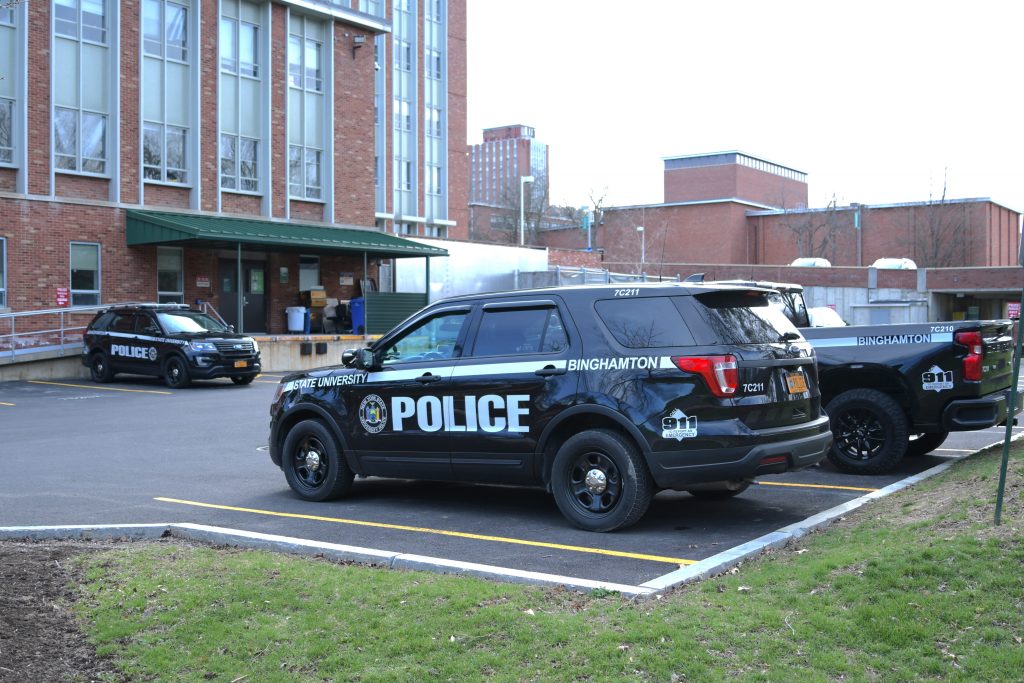Binghamton University’s Campus Citizen Review Board (CCRB), established in response to the Black Lives Matter movement, has begun to review the practices and policies of Binghamton’s New York State University Police (UPD).
Since its conception, the CCRB has established six subcommittees: mental health, arrest records, selection and training, policies and procedures, community policing and complaints and community outreach and engagement, according to Karen Jones, co-chair of the CCRB and vice president of Diversity, Equity and Inclusion (DEI). Each committee is currently responsible for researching their respective topics with the goal of guiding and recommending action in their respective areas.
“We are continuing to gather information and discuss best approaches,” Jones said. “Each time we meet we learn something new to further guide our work. Some actions are easier than others, like the creation of a website versus impacting our recruitment practices to further diversify the department and/or examining best practices for community policing and comparing such to what is already taking place.”
Myra Sabir, co-chair of the CCRB and associate professor of human development, is currently serving on the selection and training committee. Sabir gave the example of police bias training as an area that needs more research, as she said she believes prior research has not paid enough attention to the emotional aspects of bias. The CCRB will submit any recommendations it creates at the end of each semester to BU President Harvey Stenger.
Sabir explained that she recently completed the training course “Promoting and Protecting Civil and Human Rights” through the Auschwitz Institute for the Prevention of Genocide and Mass Atrocities alongside UPD Chief of Police John Pelletier.
“We met weekly one-to-one over the course of the six weeks to discuss the content, which we found useful in many ways,” Sabir said. “[Pelletier] has arranged for members of his senior staff to also take the training.”
Tina Chronopoulos, associate professor of classical and near eastern studies, is a current member of the CCRB. Chronopoulos said she was motivated to join the CCRB as a way to create effective change within UPD so students and staff who have reason to be afraid of the police, due to appearance, identity or other reasons, can be on campus without fear.
“My personal wish in terms of accomplishments is for us to put together concrete proposals [and] suggestions for how policing on campus can be reduced or changed in a way that empowers the campus community,” Chronopoulos wrote in an email. “Specifically, I’d like us to find ways to shift money from the UPD budget toward other initiatives, such as community-based safety and transformative justice programs that do not involve the police and more varied opportunities for getting help that are not centered on the police, and instead make use of specially trained mediators or mental health professionals. My personal vision is a campus with fewer police and fewer, perhaps even no weapons.”
Jabari Randolph, a senior majoring in human development, is currently a student member of the CCRB. They said they believed the board should work toward reducing police power and presence, while also building community safety.
“I would like the board to examine student conduct, [human resource] guidelines, course policies, [Services for Students with Disabilities], mental and physical health resources, the Q Center, the [the Multicultural Resource Center], Title IX procedures, hiring practices and admission guidelines for evidence of inequity or outright discrimination,” Randolph wrote in an email. “I would also like for the board to establish nominations and campus-wide voting processes in electing new members to the board. I also want the board to gather an awareness of all the racial, class, gender [and] sexual discrimination, abuses of power, lack of accommodations, unacceptable policies and names of all those who fail to be held accountable on campus. I’d like to establish a common historical and critical evaluation of the role of policing and structural harm we are all positioned in.”
Allison Zuckermann, an undeclared freshman, said she was glad to see BU making efforts to respond to the demand of its students and current events but did not think the UPD would establish any lasting change.
“I appreciate that the University is making an effort to address the concerns of students of color, but I worry no fundamental change will be made,” Zuckermann said. “I think nothing will happen because the University has shown that it will not act when it comes to racism in the past.”



